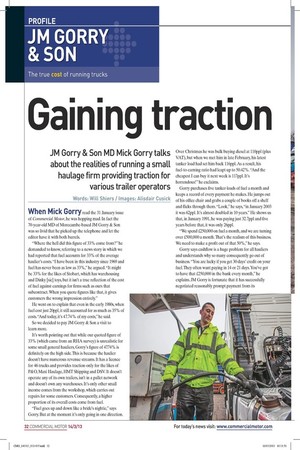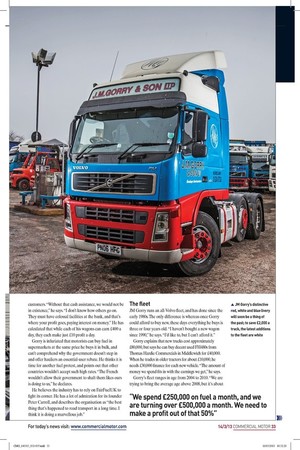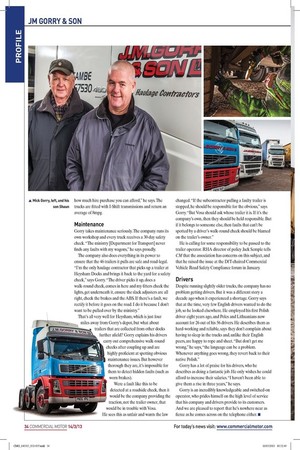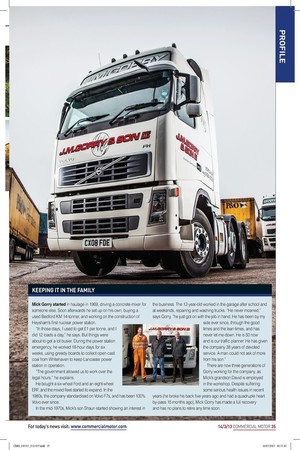Gaining traction JM Gorry & Son MD Mick Gorry talks
Page 19

Page 20

Page 21

Page 22

If you've noticed an error in this article please click here to report it so we can fix it.
about the realities of running a small haulage firm providing traction for various trailer operators Words: Will Shiers / Images: Alisdair Cusick When Mick Gorry read the 31 January issue of Commercial Motor, he was hopping mad. In fact the 70-year-old MD of Morecambe-based JM Gorry & Son was so livid that he picked up the telephone and let the editor have it with both barrels.
"Where the hell did this figure of 33% come from?" he demanded to know, referring to a news story in which we had reported that fuel accounts for 33% of the average haulier's costs. "I have been in this industry since 1969 and fuel has never been as low as 33%," he argued. "It might be 33% for the likes of Stobart, which has warehousing and Dinky [sic] toys, but it isn't a true reflection of the cost of fuel against earnings for firms such as ours that subcontract. When you quote figures like that, it gives customers the wrong impression entirely."
He went on to explain that even in the early 1980s, when fuel cost just 20ppl, it still accounted for as much as 35% of costs. "And today, it's 47.74% of my costs," he said.
So we decided to pay JM Gorry & Son a visit to learn more.
It's worth pointing out that while our quoted figure of 33% (which came from an RHA survey) is unrealistic for some small general hauliers, Gorry's figure of 47.74% is definitely on the high side. This is because the haulier doesn't have numerous revenue streams. It has a licence for 46 trucks and provides traction-only for the likes of P&O, Maxi Haulage, HMT Shipping and DSV. It doesn't operate any of its own trailers, isn't in a pallet network and doesn't own any warehouses. It's only other small income comes from the workshop, which carries out repairs for some customers. Consequently, a higher proportion of its overall costs come from fuel.
"Fuel goes up and down like a bride's nightie," says Gorry. But at the moment it's only going in one direction. Over Christmas he was bulk buying diesel at 110ppl (plus VAT), but when we met him in late February, his latest tanker load had set him back 116ppl. As a result, his fuel-to-earning ratio had leapt up to 50.42%. "And the cheapest I can buy it next week is 117ppl. It's horrendous!" he exclaims.
Gorry purchases five tanker-loads of fuel a month and keeps a record of every payment he makes. He jumps out of his office chair and grabs a couple of books off a shelf and flicks through them. "Look," he says, "in January 2003 it was 62pp1. It's almost doubled in 10 years." He shows us that, in January 1991, he was paying just 32.7ppl and five years before that, it was only 26pp1.
"We spend £250,000 on fuel a month, and we are turning over £500,000 a month. That's the realism of this business. We need to make a profit out of that 50%," he says.
Gorry says cashflow is a huge problem for all hauliers and understands why so many consequently go out of business. "You are lucky if you get 30 days' credit on your fuel. They often want paying in 14 or 21 days. You've got to have that £250,000 in the bank every month," he explains. JM Gorry is fortunate that it has successfully negotiated reasonably prompt payment from its customers. "Without that cash assistance, we would not be in existence," he says. "I don't know how others go on. They must have colossal facilities at the bank, and that's where your profit goes, paying interest on money." He has calculated that while each of his wagons can earn £400 a day, they each make just £10 profit a day.
Gorry is infuriated that motorists can buy fuel in supermarkets at the same price he buys it in bulk, and can't comprehend why the government doesn't step in and offer hauliers an essential-user rebate. He thinks it is time for another fuel protest, and points out that other countries wouldn't accept such high rates. "The French wouldn't allow their government to shaft them likes ours is doing to us," he declares.
He believes the industry has to rely on FairFuelUK to fight its corner. He has a lot of admiration for its founder Peter Carroll, and describes the organisation as "the best thing that's happened to road transport in a long time. I think it is doing a marvellous job." The fleet JIM Gorry runs an all-Volvo fleet, and has done since the early 1980s. The only difference is whereas once Gorry could afford to buy new, these days everything he buys is three or four years old. "I haven't bought a new wagon since 1990," he says. "I'd like to, but I can't afford it."
Gorry explains that new trucks cost approximately £80,000, but says he can buy decent used FH480s from Thomas Hardie Commercials in Middlewich for £40,000. When he trades in older tractors for about £10,000, he needs £30,000 finance for each new vehicle. "The amount of money we spend fits in with the earnings we get," he says.
Gorry's fleet ranges in age from 2004 to 2010. "We are trying to bring the average age above 2008, but it's about how much hire purchase you can afford," he says. The trucks are fitted with I-Shift transmissions and return an average of 8mpg.
Maintenance Gorry takes maintenance seriously. The company runs its own workshop and every truck receives a 30-day safety check. "The ministry [Department for Transport] never finds any faults with my wagons," he says proudly.
The company also does everything in its power to ensure that the 46 trailers it pulls are safe and road-legal. "I'm the only haulage contractor that picks up a trailer at Heysham Docks and brings it back to the yard for a safety check," says Gorry. "The driver picks it up, does a walk-round check, comes in here and my fitters check the lights, get underneath it, ensure the slack adjusters are all right, check the brakes and the ABS. If there's a fault, we rectify it before it goes on the road. I do it because I don't want to be pulled over by the ministry."
That's all very well for Heysham, which is just four miles away from Gorry's depot, but what about trailers that are collected from other docks further afield? Gorry explains his drivers carry out comprehensive walk-round checks after coupling up and are highly proficient at spotting obvious maintenance issues. But however thorough they are, it's impossible for them to detect hidden faults (such as worn brakes).
Were a fault like this to be detected at a roadside check, then it would be the company providing the traction, not the trailer owner, that would be in trouble with Vosa.
He sees this as unfair and wants the law changed. "If the subcontractor pulling a faulty trailer is stopped, he should be responsible for the obvious," says Gorry. "But Vosa should ask whose trailer it is. If it's the company's own, then they should be held responsible. But if it belongs to someone else, then faults that can't be spotted by a driver's walk-round check should be blamed on the trailer's owner."
He is calling for some responsibility to be passed to the trailer operator. RHA director of policy Jack Semple tells CM that the association has concerns on this subject, and that he raised the issue at the Df T-chaired Commercial Vehicle Road Safety Compliance forum in January.
Drivers Despite running slightly older trucks, the company has no problem getting drivers. But it was a different story a decade ago when it experienced a shortage. Gorry says that at the time, very few English drivers wanted to do the job, so he looked elsewhere. He employed his first Polish driver eight years ago, and Poles and Lithuanians now account for 26 out of his 56 drivers. He describes them as hard-working and reliable, says they don't complain about having to sleep in the trucks and, unlike their English peers, are happy to rope and sheet. "But don't get me wrong," he says, "the language can be a problem. Whenever anything goes wrong, they revert back to their native Polish."
Gorry has a lot of praise for his drivers, who he describes as doing a fantastic job. He only wishes he could afford to increase their salaries. "I haven't been able to give them a rise in three years," he says.
Gorry is an incredibly knowledgeable and switched-on operator, who prides himself on the high level of service that his company and drivers provide to its customers. And we are pleased to report that he's nowhere near as fierce as he comes across on the telephone either. • KEEPING IT IN THE FAMILY Mick Gorry started in haulage in 1969, driving a concrete mixer for someone else. Soon afterwards he set up on his own, buying a used Bedford KM 14-tonner, and working on the construction of Heysham's first nuclear power station.
"In those days, I used to get £1 per tonne, and I did 12 loads a day," he says. But things were about to get a lot busier. During the power station emergency, he worked 18-hour days for six weeks, using greedy boards to collect open-cast coal from Whitehayen to keep Lancaster power station in operation.
"The government allowed us to work over the legal hours," he explains.
He bought a six-wheel Ford and an eight-wheel ERF, and the mixed fleet started to expand. In the 1980s, the company standardised on Volvo F7s, and has been 100% Volvo ever since.
In the mid-1970s, Mick's son Shaun started showing an interest in the business. The 12-year-old worked in the garage after school and at weekends, repairing and washing trucks. "He never moaned," says Gorry, "he just got on with the job in hand. He has been by my side ever since, through the good times and the lean times, and has never let me down. He is 50 now and is our traffic planner. He has given the company 38 years of devoted service. A man could not ask of more from his son."
There are now three generations of Gorry working for the company, as Mick's grandson David is employed in the workshop. Despite suffering some serious health issues in recent years (he broke his back five years ago and had a quadruple heart by-pass 15 months ago), Mick Gorry has made a full recovery and has no plans to retire any time soon.






































